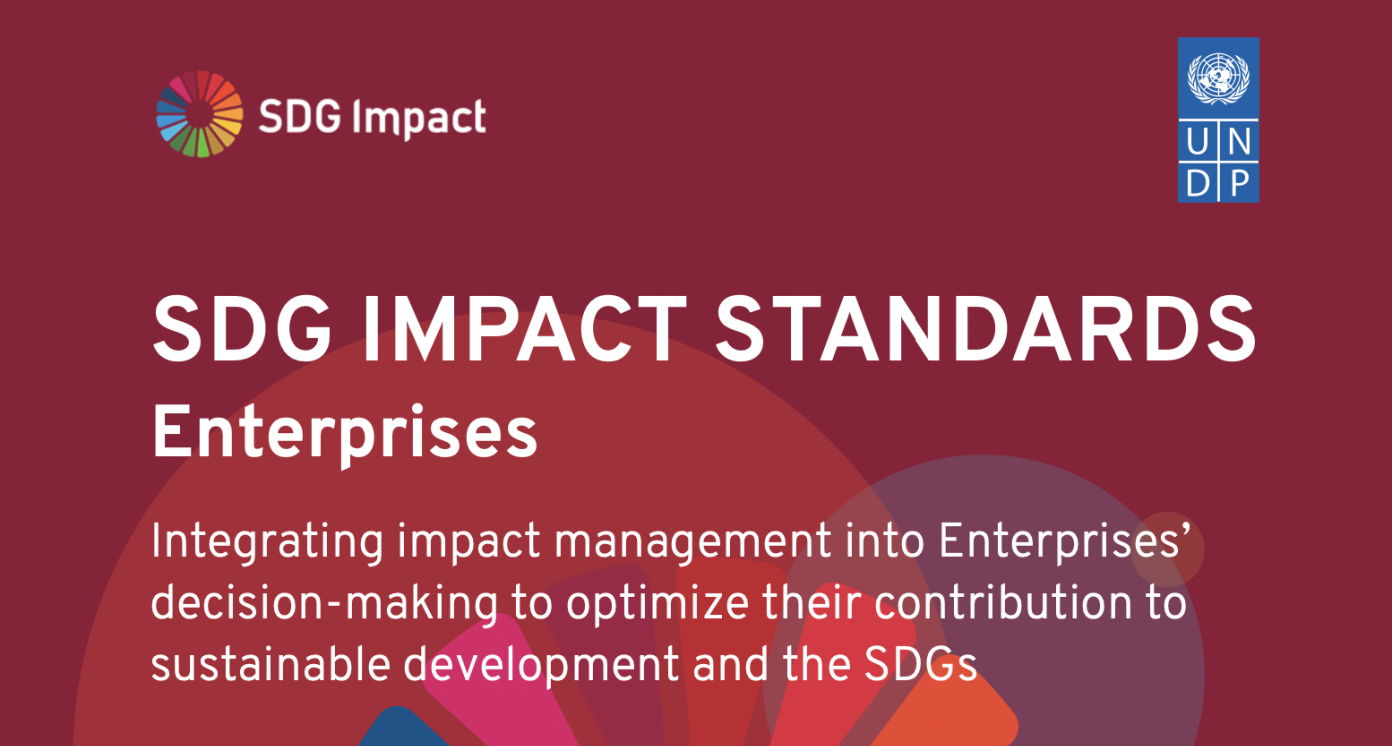By Fabienne Michaux, Director of UNDP SDG Impact
Every day, more and more enterprises and investors are looking for straightforward ways to operate more sustainably and make a positive contribution to the Sustainable Development Goals (SDGs) – the world’s blueprint to achieve a better and more sustainable future for all. Indeed, enterprises and investors increasingly recognize that sustainable development is at the very heart of long-term value creation – for organizations and for society – and failing to achieve the SDGs is a constraint on economic potential and undermines system stability, future business prospects and future investment performance.
Embedding the SDGs into decision making can help enterprises and investors use a common language and shared purpose to open-up new business and investment opportunities and efficiency gains; future proof their businesses and investment portfolios; manage risk more effectively; enhance their reputation; attract and retain employees, consumers, B2B customers, and investors; strengthen their stakeholder relations; drive innovation; secure their social license to operate; keep pace with – and anticipate future – policy developments; and help stabilize societies and markets (see here for sources). But we are not yet on a sustainable path and there is a lack of clear guidance on how organizations can translate intent to action. The SDG Impact Standards developed by UNDP aim to address this knowledge gap and move organizations from SDG alignment to SDG action – from thinking about the SDGs as an add-on to what business gets done to how all business gets done.
As a key contribution of the UNDP Finance Sector Hub (FSH) flagship initiative SDG Impact, we are pleased to announce the release of Version 1.0 of the UNDP SDG Impact Standards for Enterprises, the latest in a harmonized suite of impact standards targeted to different actors in the system, including for Private Equity Funds, Bond Issuers, and the OECD-UNDP Impact Standards for Financing Sustainable Development which were developed by OECD in collaboration with UNDP.
The SDG Impact Standards are decision-making standards, not performance or reporting standards. They are designed to help organizations integrate operating responsibly and sustainably and contributing positively to sustainable development and the SDGs into organizational systems, investment frameworks and decision-making practices, using a common language and shared approach to do so.
The SDG Impact Standards are organized around four interconnected themes – strategy, management approach, transparency, and governance – each of which plays an important role in fully integrating sustainability and contributing positively to the SDGs into organizational systems and decision making. They are designed to transform how enterprises and investors think about value creation and integrate impact management and contributing positively to the SDGs into their organizational systems and decision-making practices. This shift of internal practices towards impact integrity and governance allows enterprises and investors to manage all material - positive and negative - impacts in direct operations and through supply and value chains, with a view to maximising net positive impact over time.
All of the SDG Impact Standards, including the Enterprise Standards, have undergone extensive consultations, including two rounds of public consultations. To do justice to many of the emerging economies where UNDP supports Governments in achieving national development goals and works with communities to leave no one behind, we also convened a working group for Micro, Small and Medium Enterprises (MSMEs) as part of the second consultation round on the Enterprise Standards. The insights from the MSME working group will help to inform the development of the assurance framework that will support the SDG Impact Standards and ensure its accessibility across enterprises of different sizes and stages of maturity and operating in different market contexts.
The SDG Impact Standards are supported by a suite of complementary resources and services, including guidance notes and resources (currently under development), and a freely available online impact measurement and management training course being released on Coursera in September 2021 through Duke University by its Center for the Advancement of Social Entrepreneurship (CASE). Training on impact management and the standards is being rolled out across UNDP’s Country Offices and training on the SDG Impact Standards and for assurers is currently under development.
While the SDG Impact Standards can be used independently by enterprises and investors as a best practice and self-assessment tool, an open-source external assurance framework and SDG Impact Seal are also being developed in tandem with the SDG Impact Standards. We expect to start piloting the assurance framework in Q4 of 2021. Organizations are highly recommended to move from self-assessment to having their impact management practices assured at regular intervals by an independent accredited assurer. Independent assurance is an important mechanism to build market trust and confidence and reduce the potential for impact washing or the over-statement of claims. The assurance process is designed to provide assurance that the organization has the policies and processes in place to achieve the objective of the SDG Impact Standards. The development of the Assurance Framework and Assurance Protocols will also reduce the risk of a proliferation of proprietary assurance approaches that may vary in quality and the level of transparency provided. Recognizing that the SDG Impact Standards represent best practice, and it will take organizations time to fully implement them, assurance will be provided against the minimum thresholds that should be met but requiring continuous improvement towards the best practice indicators over time. The assurance protocols and minimum thresholds will be publicly available and may be helpful to organizations in planning their implementation roadmap before they seek independent assurance of their practices from an accredited assurer.
We are thrilled to be adding the SDG Impact Standards for Enterprises to the existing suite of SDG Impact Standards and are encouraged by their application and integration across markets to-date: In China, for example, the New Development Bank (NDB) piloted using the SDG Impact Standards for Bond Issuers (alongside the UNDP developed China SDG Taxonomy) to issue a three-year fixed rate RMB 5 billion Bond in the country’s Interbank Bond Market. Using the SDG Impact Standards for Enterprises, Japan’s Rating and Investment Information, Inc. (R&I) provided a third-party opinion evaluating the “Kobe 2025 Vision” of the city of Kobe towards the SDGs, where it recognized that UNDP’s framework can be a global language to demonstrate the private sector’s philosophy and vision towards the SDGs.
Please visit the SDG Investor Platform at https://sdginvestorplatform.undp.org, follow us on Twitter and sign up to the UNDP FSH Newsletter to receive updates on the SDG Impact Standards and our complementary impact intelligence support for investors and Governments. Please do not hesitate to contact us via sdgimpact.standards [atat] undp.org (sdgimpact[dot]standards[at]undp[dot]org) for any inquiries.


















